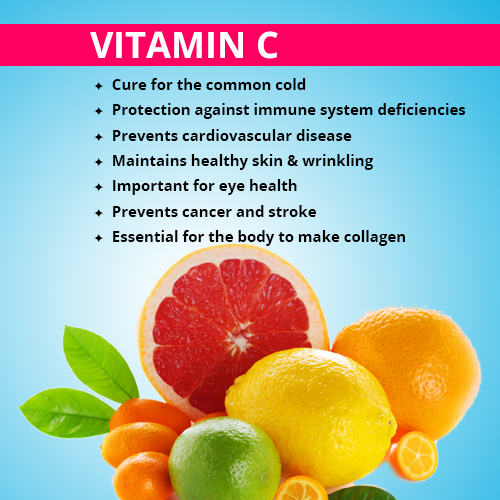Helps With Sun Damage
Ultraviolet radiation from the sun or tanning beds is one of the leading causes of skin cell aging and damage over time. When the sun strikes your skin, it forms what are called free radicals, which lead to skin damage. But vitamin C can help limit this damage due to its antioxidant properties.
Antioxidants, like vitamin C, prevent cell damage by neutralizing free radicals from harmful effects like smoking and the sun.
“Vitamin C works to bind these free radicals, and acts like little Pac-Men taking them out of circulation so that they can’t do damage to the skin,” says Suzanne Friedler, MD, a board-certified dermatologist and Clinical Instructor at Mount. Sinai Medical Center.
It’s important to know that vitamin C serums can’t act as a replacement for sunscreen because it does not block and absorb the ultraviolet radiation from the sun. However, using a combination of both will provide your skin with ample protection against sun damage.
A Word About Safety And Side Effects
When incorporating topical vitamin C serum, cream or moisturizer into your daily skin care regimen, irritation is unlikely, however as with any skin care product, you should always do a patch test beforehand to make sure you tolerate it well.
If your skin is particularly sensitive, avoid vitamin C serums with LAA as an active ingredient this can cause irritation. While LAA is considered a strong choice when seeking a vitamin C product with potent antioxidant benefits, products with MAP may be less likely to cause irritation and are considered safer for sensitive skin.
If you have sensitive skin but still prefer to choose an LAA vitamin C serum, you could simply avoid those with a high concentration. Instead, try a serum with a lower concentration of LAA. Topical 23.8% LAA serums have been shown to be effective at treating photoaged skin without causing side effects.
It Helps Fade Hyperpigmentation
Since it impedes melanin production, vitamin C can actually fade hyperpigmentation.
Hyperpigmentation including sunspots, age spots, and melasma occurs when melanin is overproduced in certain areas of the skin. It can also happen in areas where acne has healed.
Vitamin C by downregulating the activity of an enzyme known as tyrosinase. Its widely used in dermatology for depigmentation of hyperpigmented spots on the skin.
Its also been used for treatment of gingival melanin hyperpigmentation , though studies are limited.
Read Also: Is Squamous Cell Carcinoma Treatable
How To Start Using Vitamin C Daily
The question of when to apply vitamin C is a hot beauty podcast topic. Everyone seems to have their own opinion on how to get the best results.
We think that the best way to start incorporating a new vitamin C product into your daily routine is by narrowing down which aspect of your skin you would like to improve. For example, do you want to prevent fine lines and wrinkles? Or would you rather fade dark spots?
You might not think that the time at which you use vitamin C would matter much, but it’s actually important to figure out in advance if you want to target specific skin imperfections. That’s because factors like sun exposure can impact the benefits of this revitalizing antioxidant.
More helpful reading: Lines under eyes
Including Vitamin C In Your Routine Reduces The Appearance Of Hyperpigmentation On Your Skin

Don’t you hate it when sunspots and age spots start showing up on your face? A thick layer of concealer might hide these spots, but their appearance signals that your skin is facing severe sun damage.
There are several benefits of using natural vitamin C serum on your face for skincare: one of its most potent benefits is its ability to reduce the appearance of hyperpigmentation on your face. How does it manage to do that, you ask?
Natural Vitamin C inhibits the melanin production in your skin, allowing the gradual fading of sunspots and brown spots. Maintaining normal skin pigmentation while helping take away brown spots is one of the most valuable vitamin C serum benefits for the face.
Related: Hear How Ranju Reduced Pigmentation and Acne Scars With Apsaras Vitamin C Serum!
Recommended Reading: Can Stage 4 Melanoma Be Cured
Consuming Too Much Vitamin C
Everything might cause a risk if being consumed excessively, the same goes to vitamin C. While being consumed under recommendation intake, vitamin C is generally regarded as safe. Side effects are rarely reported, however minor effect might happen to certain people such as, diarrhea, nausea, abdominal cramps, and other symptoms.
Different case for healthy individuals for the body can only hold and use about 200-250 mg of vitamin C a day, and the rest go through urine. At times of illness, during recovery from injury, or under stress, the body can hold greater amounts. Be cautions that high doses of vitamin C may contribute to Kidney malfunction, as well as diarrhea, nausea, and gastritis.
What Are The Skin Benefits Of Vitamin C
Vitamin C is a well-known antioxidant in skincare, says Lian Mack, M.D., a dermatologist in New York City. In skin, this antioxidant has several functions including playing a role in the production of collagen, improving hyperpigmentation and neutralizing free radicals. Here are the primary benefits of vitamin C when applied topically to the skin:
It protects skin cells from environmental damage
Vitamin C’s main function in skin is that of a powerful antioxidant, protecting from cellular damage caused by free radicals.Free radicals are the molecules produced by the body when exposed to radiation from the sun, tobacco, smoke, X-rays or other sources, Dr. Mack explains, and they are highly reactive. Vitamin C neutralizes these free radicals by donating electrons, preventing them from damaging skin.
Unlike sunscreens that absorb or reflect harmful UV rays from the sun to prevent sunburn, topical vitamin C offers protection through its role as an antioxidant. Since it doesnt have the same mechanism of action as a sunscreen, vitamin C is not a sunscreen and should never replace your SPF. Rather, they complement each other and can be combined for optimal effects.
It brightens skin and reduces hyperpigmentation
The ingredient is also one of the gold standards for evening skin tone and boosting radiance. Vitamin C is a well-known skin brightener, impeding melanin production and ultimately fading dark spots, resulting in a more even complexion, Dr. Mack explains.
Recommended Reading: Can Melanoma Be Skin Colored
Protects Your Skin From The Elements
We have already mentioned the excellent protection that the usage of vitamin C serum on the face can offer against sun damage. Did you know that it also protects your skin against dirt and pollution? Consistent exposure to UV rays and pollution tends to erode your skins natural glow and protective barriers. With regular usage of Vitamin C serum on the face, you can counter the effects of these harmful elements and protect your skins health and radiance.
Your skin deserves the best care and a gentle touch. We highly recommend using all-natural products to nourish and rejuvenate your skin. If you are convinced that a Vitamin C Serum is essential for your skincare, bring home our all-natural Ayurvedic Vitamin C Natural Glow Serum today!
It Helps Reduce Redness And Even Out Your Skin Tone
Vitamin C has also been shown to act as an anti-inflammatory agent through its antioxidant capacity, according to a . This means it soothes your skin and reduces puffiness, letting your face shine through.
Vitamin Cs anti-inflammatory action
- neutralize free radicals that cause oxidative damage
- optimize the immune system to discourage inflammatory immune response
The anti-inflammatory properties of vitamin C can also help reduce redness, which in turn can create a more even complexion. The combined reduction of dark spots, redness, and irritation make for a clear, smooth skin tone.
Recommended Reading: How To Prevent Melanoma Skin Cancer
Fact: Vitamin C Serums Are Not Just For Anti
Vitamin C levels deplete in skin over time so using skincare products with Vitamin C is important as you grow older. However, these formulas are still effective to use before you start to see fine lines and wrinkles. These formulas help boost radiance and provide antioxidant protection to help defend skin from early signs of aging.
Do I Need To Refrigerate My Vitamin C Serum
It is not necessary to refrigerate vitamin C serum, but some people prefer to do so as it can help extend the shelf life of the product. If you choose to refrigerate your vitamin C serum, be sure to store it in a dark, cool place away from light exposure as this can degrade the quality of the vitamin C. When stored properly, vitamin C serum can last for up to six months before it needs to be replaced.
Don’t Miss: How Can I Get Skin Cancer
The Container Shouldnt Let Air Or Light In
Vitamin C is super-sensitive to light, so the suns rays will break it down faster if its in clear packaging. As such, you also want to keep it stashed away in a cool, dark space such as the fridge as heat exposure reduces its potency too.
Although vitamin C serums are often a yellowish color, if the tint turns darker or brownish, thats a sign its turned and should be tossed.
Is It Safe To Use Vitamin C With Retinol

In the past, it was thought that you should avoid using vitamin C products with retinoidsvitamin A derivatives that encourage skin cell turnoverat all costs. And thats still sort of true. While theyre both powerful, science-backed skin-care ingredients, they work best in different skin environments, so using them at the same time may make both less effective. And because they both promote cell turnover, experts do still advise against using these two ingredients together, Dr. Hogan says.
But its generally okay to use them on the same day at different times. Experts typically recommend using vitamin C products in the morning and retinoids at night. This route often ends up working out best since retinol products can increase the skins sensitivity to UV rays, which is why its better to save them for p.m. use.
Recommended Reading: What Does Skin Cancer Look Like When It First Starts
What About An At
While you can follow many of the same steps for a facial at home, its hard to replicate the experience of a spa facial. Compare it to rubbing your own feet or getting a professional foot massage theyre essentially the same thing, but the experiences are completely different.
Still, if youd like to enjoy the benefits of vitamin C without heading to the spa, you can absolutely follow the steps in a standard facial cleansing, exfoliating, massage and then use a vitamin C mask or serum.
I think vitamin C serums are best, Duffy says. That way you can layer sunscreen on top and it doesnt feel too heavy.
Incorporating a vitamin C serum into your regular routine has the added benefit of consistency. A daily vitamin C serum would be better than a vitamin C facial because the serum is applied daily, notes Duffy.
Keep in mind, too, that vitamin C is unstable, reactive, and prone to losing its antioxidant properties when exposed to air, light, and heat.
So, while you can find vitamin C powder, mixing it up with your favorite moisturizer may not yield the results you hope for. For maximum efficacy, your best option usually involves buying quality vitamin C products instead of trying to make them yourself.
Who Should Not Use Vitamin C For Skin Care
The general recommendation is that children should not use vitamin C for skin care.
People with sensitive skin should be cautious about using products with vitamin C for skin care. If they want to try such a product, they should first test a small amount of it on their arm before applying it to their face. They should only use it every other day at most.
Below are some common questions about vitamin C.
Don’t Miss: Does Skin Cancer Make You Feel Tired
Fiction: The More Vitamin C The Better
While it may seem like a higher level of Vitamin C would be better, these formulas can actually cause sensitivity or be less effective if they are not stabilized properly. When products have concentrations of L-Ascorbic Acid that are too high, skin can even experience irritation. Kiehls selects the best forms of stabilized Vitamin C at concentrations that are both efficacious and gentle. Our products are then dermatologist-tested for safety, demonstrating the suitability of our formulas for all skin types, including sensitive skin.
Protects Skin From Sun Damage
In addition to its anti-aging benefits, topical vitamin C is also great for protecting your skin from damageespecially from the sun’s UVA and UVB rays. That’s because vitamin C is an antioxidant, so it naturally helps to strengthen your skin and repel things that could damage it. Of course, topical vitamin C should not be considered an alternative to wearing sunscreen, but when combined with regular sunscreen application, it can really work wonders for your skin.
Don’t Miss: How To Treat Melanoma Skin Cancer
Incredible Benefits Of Vitamin C Serum For Face
Sale Alert for my readers-
- Nykaa HOT PINK SALE now LIVE From 25th to 31st July
- Huda Beauty FLAT 50% off on Iconic Palettes at Nykaa
- Faces Canada Buy1Get1 FREE at Nykaa
Join us on Telegram for regular updates.
View Nykaa Hot Pink Sale Offers
Do you want to have beautiful, healthy skin? If so, vitamin C serum is a must-have in your skincare routine. Vitamin C is essential for the production of collagen, which helps keep skin looking young and elastic. In this blog post, we will discuss the many benefits of vitamin C serum for the face. We will also provide information on how to use vitamin C serum to get the best results. So read on to learn more!
Available at Nykaa and .
A vitamin C serum is a skincare product that contains vitamin C, which is an essential nutrient for the skin. Vitamin C serums are usually applied to the face before moisturizing. They can be used on all skin types, including sensitive and acne-prone skin.
Vitamin C serums are available in different concentrations. The concentration of vitamin C in a serum will determine how potent it is. For example, a vitamin C serum with a concentration of 20% or higher is considered to be very potent.
My Pick
What Results To Expect
No matter what type of skin damage concerns you, itâs important to remember that it didnât happen overnight. Just as damage took time to build up, it takes patience and diligence to heal. While ingredients like vitamin C can help to reverse aging and prevent some damage, they cannot repair or prevent all damage. Your results may be noticeable, but they may also be subtle.
You May Like: How Quickly Does Skin Cancer Grow
Potential Functions Of Vitamin C In The Skin
The high concentration of vitamin C in the skin indicates that it has a number of important biological functions that are relevant to skin health. Based on what we know about vitamin C function, attention has been focused on collagen formation and antioxidant protection however, evidence is emerging for other activities.
Functions In Healthy Skin

Vitamin C limits the damage induced by ultraviolet light exposure. Vitamin C is not a âsunscreenâ because it does not absorb light in the UVA or UVB spectrum. Rather, the antioxidant activity of vitamin C protects against UV-induced damage caused by free radicals. Vitamin C transport proteins are increased in keratinocytes in response to UV light, suggesting an increased need for vitamin C uptake for adequate protection .
UV light decreases vitamin C content of skin, an effect that is dependent on the intensity and duration of UV exposure . In cultured keratinocytes, the addition of vitamin C reduces UV-related DNA damage and lipid peroxidation, limits the release of pro-inflammatorycytokines, and protects against apoptosis. Vitamin C also modulates redox-sensitivecell signaling in cultured skin cells and consequently increases cell survival following UV exposure .
In two rodent studies, addition of ascorbic acid to the diet reduced the size and number of dermal neoplasms and skin tumors induced by chronic UV exposure . To date, no other studies with UV exposure and oral ascorbic acid supplementation in animal models have been published.
Wound healing
Vitamin C is included in oral therapies for pressure ulcers and burns, along with vitamin E, zinc, and other nutritive factors .
Dry skin
Other functions
You May Like: What Is Melanoma Of The Brain
The Role Of Vitamin C In Skin
Vitamin C is involved in the formation of the skin barrier and collagen in the dermis and plays a physiological role in the skin against skin oxidation, in antiaging of wrinkles, and in cell signal pathways of cell growth and differentiation, which are related to the occurrence and development of various skin diseases . Vitamin C has a dual role of antioxidation and pro-oxidation, and this role maintains the balance of the two reactions in the body . Ascorbic acid and transition metals, such as Fe2+, produce reactive oxygen species outside of the cell, and high levels of ROS can destroy the antioxidant defense system of cancer cells because the antioxidation system of tumor cells is incomplete and its balance is destroyed . High levels of Vitamin C in the cells lead to oxygen-promoting reactions, which cause DNA damage, the depletion of ATP reserves, and failure of cellular metabolism . Vitamin C is also involved in resistance to UV-induced oxidative stress, inhibition of melanogenesis, and promotion of the differentiation of keratinocytes and has been used for a long time as a clinical treatment reagent. Vitamin C deficiency leads to many systemic diseases in humans and causes scurvy in the worlds navies .